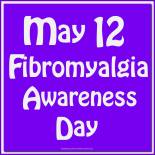 May 12th is Fibromyalgia Awareness Day and you can probably tell by now that it’s kind of important to me. But that doesn’t automatically make it important to you. We all have issues and we all deal with them ourselves, or with our closest friends – why spam social media with mine?
May 12th is Fibromyalgia Awareness Day and you can probably tell by now that it’s kind of important to me. But that doesn’t automatically make it important to you. We all have issues and we all deal with them ourselves, or with our closest friends – why spam social media with mine?
A few years ago, I found myself socialising at a formal event. Sounds fun, right? This function was trickier than usual, though, packed with hundreds of people but only a few dozen seats. My fibromyalgia made the experience a tactical operation: just to make it through the night, I had to carefully manoeuvre around the hall without ever standing up for more than a few minutes. I even managed to convince a friend to join me in my bizarre musical chairs.
As luck would have it, we were moving between tables when the music stopped – someone began to speak. Everyone quietly searched for nearby seats; my friend and I missed out in part because I couldn’t move quickly enough. Eventually we reached a table that was already full, two people sharing each seat, and had to make do with just leaning against the chairs’ backs.
Almost immediately, the pain spread along my legs and I desperately needed to sit down. I recognised almost everyone seated at the table, but had not disclosed my fibromyalgia to any of them. I had considered it to be my private business, a weakness I was reluctant to expose. But now I was in a silent room, in intense agony, unable to explain it or do anything about it without making a scene. And the speech wasn’t getting any shorter.
Oh, right. There’s something I forgot to mention earlier. The other reason I’d missed out on a seat. You see, the friend I was with had sprained his ankle that morning. He was using crutches.Read More »


 As children, almost all of us had the opportunity to discuss a very serious question: if you could have one superpower, what would it be?
As children, almost all of us had the opportunity to discuss a very serious question: if you could have one superpower, what would it be?